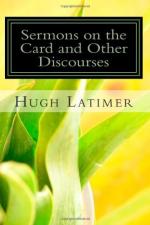The bodily ploughing is taken in and inclosed through singular commodity. For what man will let go, or diminish his private commodity for a commonwealth? And who will sustain any damage for the respect of a public commodity? The other plough also no man is diligent to set forward, nor no man will hearken to it. But to hinder and let it all men’s ears are open; yea, and a great many of this kind of ploughmen, which are very busy, and would seem to be very good workmen. I fear me some be rather mock-gospellers, than faithful ploughmen. I know many myself that profess the gospel, and live nothing thereafter. I know them, and have been conversant with some of them. I know them, and (I speak it with a heavy heart) there is as little charity and good living in them as in any other; according to that which Christ said in the gospel to the great number of people that followed him, as though they had had any earnest zeal to his doctrine, whereas indeed they had it not; Non quia vidistis signa, sed quia comedistis de panibus. “Ye follow me,” saith he, “not because ye have seen the signs and miracles that I have done; but because ye have eaten the bread, and refreshed your bodies, therefore you follow me.” So that I think many one now-a-days professeth the gospel for the living’s sake, not for the love they bear to God’s word. But they that will be true ploughmen must work faithfully for God’s sake, for the edifying of their brethren. And as diligently as the husbandman plougheth for the sustentation of the body, so diligently must the prelates and ministers labour for the feeding of the soul: both the ploughs must still be going, as most necessary for man. And wherefore are magistrates ordained, but that the tranquillity of the commonweal may be confirmed, limiting both ploughs?
But now for the fault of unpreaching prelates, methink I could guess what might be said for excusing of them. They are so troubled with lordly living, they be so placed in palaces, crouched in courts, ruffling in their rents, dancing in their dominions, burdened with ambassages, pampering of their paunches, like a monk that maketh his jubilee; munching in their mangers, and moiling in their gay manors and mansions, and so troubled with loitering in their lordships, that they cannot attend it. They are otherwise occupied, some in king’s matters, some are ambassadors, some of the privy council, some to furnish the court, some are lords of the parliament, some are presidents, and comptrollers of mints.




